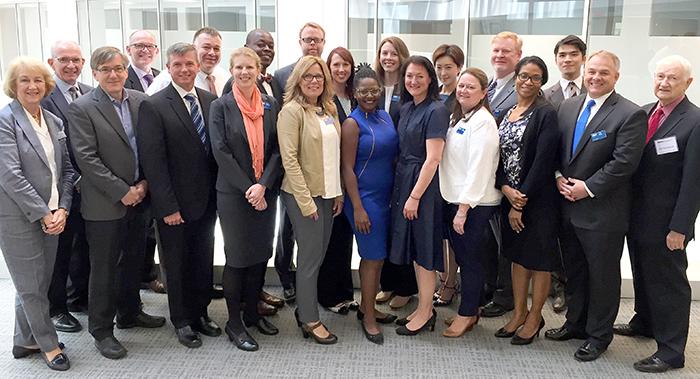
The 2017 class of Duke’s Master of Management in Clinical Informatics program recently spent three days in Washington, DC, discussing healthcare policy and innovation with stakeholders from across the industry. Class members participated in round-table discussions and listened to presentations from thirteen industry leaders, including private-sector and nonprofit CEOs, policy advisors and fellows, Department of Defense medical innovation officers, and former congressmen.
While each presentation was distinct, the speakers all centered on key questions:
- Why isn’t the healthcare industry using all available technology to improve interoperability?
- User experience: is the healthcare industry going to stay an exception for much longer?
- Is Meaningful Use effective, and what is its place in the future of health care?
- Is “hospital-at-home” the care model of the future?
- How are quality vs. quantity payment models changing the industry?
Dr. Ed Hammond, director of the Duke Center for Health Informatics, said the roster and quick pace of presentations reminded him of the story of five blind men trying to describe an elephant. Despite dealing with the same policies, networks, and stakeholders, the speakers each described disparate effects and emphasized different problems and solutions.
The information-packed days included both forward-looking presentations and overviews of current policy processes. One of the future-minded presenters was Chris Gibbons, chief health innovation officer for the Federal Communications Commission (FCC). Gibbons focused on the impact of infrastructure networks on the future of health care. He challenged the group to answer the question: “What’s holding the industry back?” Then, he took the conversation a step further. He responded to the issues the class raised with another question: “So what are you going to do about it?”
Heather Forrest, a class attendee, was pleasantly surprised by the relevance of the FCC. “The FCC being a stakeholder in healthcare innovation hadn’t occurred to me. Once Gibbons began speaking on the impact of infrastructure networks on all industries, it seemed so obvious that healthcare has a lot at stake in the development of networks. Hearing his point of view brought home for me that interoperability is a national issue. It isn't exclusive to providers and management.”
According to current student Shelley Rusincovitch, the reason the MMCi program is so engaging — and intense — is that it’s not enough to absorb perspectives. Students are expected to interact with the ideas presented. The points of view presented by students in class lead to provocative discussions. She said the experience has given her the opportunity to wrestle with ideas that may never have occurred to her otherwise. “Working together, we’ve gained a level of intellectual versatility from having our boundaries expanded. It has been so beneficial to study these issues with this interdisciplinary group, rather than in a vacuum.”
The program’s goal is to foster innovation, says Randy Sears, MMCi operations director. Getting out of the classroom and into the heart of healthcare policy allows the students to see how the industry is handling questions they’ve been working with all year. They discuss key issues and theories in class. In DC, they learned how stakeholders are responding to those issues.
Rusincovitch agrees. “The perspectives presented in DC added another layer to these ideas. They gave me a richer view of the themes we‘ve been talking about all year and a fuller appreciation for specific policies and their effects. In class, we talk about how key policies affect management and informatics. In DC, we got to hear from people who work with the real-life implications of policies such as Meaningful Use, the Affordable Care Act, and 21st Century Cures.“
Forrest says she is encouraged that professionals ‘in the real world’ reinforced everything they’ve been learning in the program. “In the sterile environment of class, it’s easy to talk about all the options and ideas we have. But it was so encouraging to see that in government, in the private sector, in nonprofits — they’re all coming at these issues from different mindsets, but they’re using the same principals we’re learning to affect real change and move the healthcare system into the future.”